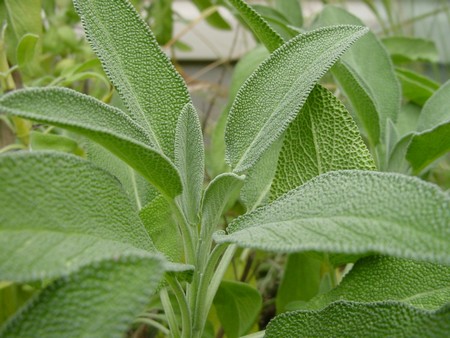Herbal remedy
Sage is highly antiseptic with antibacterial and antifungal properties. In the past it would have helped with intestinal and chest infections which could often have been fatal. Sage tea is an excellent remedy for colds, fevers and sore throats and can be taken at the first symptoms of any respiratory infection. It can be used for tonsillitis, bronchitis, asthma, catarrh and sinusitis. It is an old remedy for TB and other infections accompanied by night sweats. It can be used to enhance the immune system and prevent infection as well as for auto-immune disease. It has cleansing properties and acts as a diuretic making it useful in toxic conditions and for arthritis and gout.
Sage makes a good digestive remedy as it relaxes spasm and relieves colic and griping. It stimulates the appetite and improves digestion and has a beneficial action on the liver. It has been traditionally used in cooking with rich and heavy foods to aid their digestion. It can be given for anorexia, indigestion, wind, nausea, bad breath, excessive salivation, diarrhoea, colitis, liver and gall-bladder problems and worms.
Sage has a tonic effect on the female reproductive tract and can be used for scanty menstruation, irregular or absent periods, menstrual cramps and heavy bleeding. Its oestrogenic properties make sage excellent for menopausal problems, particularly as it has the added bonus of reducing sweating, and relieving hot flushes and night sweats. Its stimulating effect on the uterus can be put to good effect during childbirth and to expel the placenta. For this reason sage should not be taken during pregnancy. Neither is it recommended while breastfeeding as it stops the flow of milk, though making it useful when weaning.
Sage has a beneficial action on the central nervous system. In Ayurvedic medicine it is used to clear emotional obstructions from the mind and for promoting calmness and clarity. It curbs excessive desire and passions and calms the heart. Recent research has shown that sage has strong antioxidant properties, helping to delay the ageing process and reduce the harmful effect of free radicals.
Externally, sage is a first rate antiseptic and astringent for cuts and wounds, burns, sores, sunburn and ulcers. It makes a lotion for inflammatory skin conditions, and a liniment for painful joints. It is used as a gargle for sore throats and a mouthwash for mouth ulcers, inflamed gums and excessive salivation, and a douche to relieve vaginal infections such as thrush.
Homeopathic remedy: Salvia officinalis
Sage is used for night sweats, particularly those in TB sufferers when associated with a tickly cough.
Aromatherapy oil
The essential oil of sage is used but only with great caution. The high proportion of thujone in the oil could, if used in large amounts, cause epileptic fits, convulsions or even paralysis. It is interesting that when used as a herbal remedy sage acts as a tonic to the nervous system and was a medieval cure for palsy, since the thujone is far less concentrated in the whole plant than in the extracted oil. In the uterus the use of the oil can stimulate contraction of uterine muscles, which can be useful during childbirth, but should be avoided during pregnancy because of the risk of miscarriage. It can also induce heavy menstrual bleeding. Sage’s relative, clary sage, contains a much lower concentration of thujone and shares many of its properties; its use is preferred when treating women as it is a much gentler remedy.
Sage oil can be used in gargles and mouthwashes when diluted with water and alcohol to a low concentration (1 drop per 10 ml of liquid) or a few drops in a bowl of hot water can be used as an inhalation for coughs, colds and catarrh. It can also be used in massage oils for men — it is warming and penetrating to the muscles, particularly useful for men with muscles developed from taking part in sports or weight training.
The flower essence
Sage enhances the capacity for drawing wisdom from experience and is particularly recommended for people who find it hard to find purpose and meaning in life. They may feel resentful about events in their lives, seeing them as ill-fated or undeserved.
Sage is a remedy especially suitable for our later years, for helping to accept what life throws up for us in a calm and detached way. It helps to enhance the wisdom that comes naturally from years of experience. Such wisdom is natural to that end of life, enabling us to be in touch with our spiritual selves, to perceive a higher purpose in life and to experience inner peace. It is a remedy to use during changes and transitions, as it enhances the sage in all of us.

